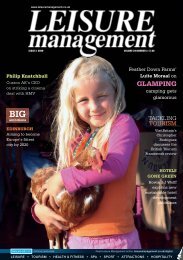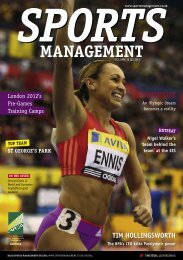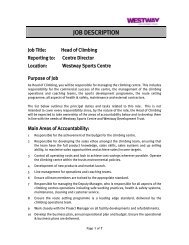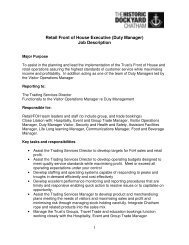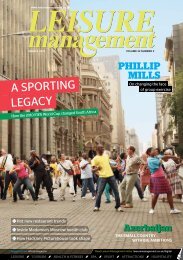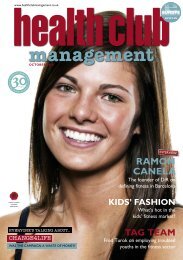Sports Management Issue 1 2012 - Leisure Opportunities
Sports Management Issue 1 2012 - Leisure Opportunities
Sports Management Issue 1 2012 - Leisure Opportunities
You also want an ePaper? Increase the reach of your titles
YUMPU automatically turns print PDFs into web optimized ePapers that Google loves.
Hosting major sporting events,<br />
such as the Sochi 2014 Winter<br />
Olympics, can inspire the<br />
Russians to embrace change<br />
Russia’s Red Square logo launch<br />
of the Sochi 2014 Winter<br />
Olympic and Paralympic Games<br />
the IIHF World Championships. In Soviet<br />
Union days, Russia had won seven<br />
Olympic and 22 World Ice Hockey titles,<br />
an unrivalled record, yet this was its<br />
first World title for 15 years. Also in May<br />
2008, the city of Kazan, in Tartarstan,<br />
won the rights to host the 2013 edition<br />
of the FISU – the University <strong>Sports</strong> Federation<br />
– Summer Universiade.<br />
So 2008 was clearly a year of significance<br />
for Russian sport, however bidding<br />
committees had, in fact, been working<br />
on bids to host major events for some<br />
years previously.<br />
This is evidenced in its unsuccessful<br />
bid to host the <strong>2012</strong> Olympic Games,<br />
work for which actually commenced in<br />
2003 or earlier. For example, the bidding<br />
process for its right to host Sochi<br />
2014, won in July 2007, would have<br />
commenced two to three years earlier.<br />
Meanwhile, Russia launched its unsuccessful<br />
bid for Moscow to host the 2010<br />
Youth Olympic Games in 2007, while<br />
work on its successful Kazan 2013 Universiade<br />
bid, won in 2008, would have<br />
begun at least two years previously.<br />
Since many commentators are in<br />
general agreement that much of the<br />
success in winning these major international<br />
events for Russia can be attributed<br />
to the personal support of Prime Minister<br />
Laura cross-country skiing venue for the Sochi 2014 Winter Games<br />
Sport quickly became recognised as the tool of choice<br />
by Russia’s leadership, who looked to harness its power<br />
to deliver a number of social and political outcomes<br />
Vladimir Putin, I would argue that there<br />
is strong cause to regard the year<br />
2000 – the year of Putin’s election as<br />
Russian president – as the milestone year.<br />
It is apparent too that Putin very quickly<br />
recognised the power of sport and the<br />
positive impact on the country’s image.<br />
In August 2000, he stated: “Victories in<br />
sport do more to cement the nation than<br />
a hundred political slogans”.<br />
So sport quickly became recognised<br />
as the tool of choice by Russia’s leadership,<br />
who looked to harness its power to<br />
deliver a number of social and political<br />
outcomes, as stated in table (Fig.2).<br />
FINANCIAL BACKING<br />
Although Putin has invested much personal<br />
energy and commitment into<br />
attracting these major sports events and<br />
has put his personal reputation on the<br />
line, none of this would be possible without<br />
adequate financial backing. Even<br />
before Putin came to power, following<br />
Boris Yeltsin’s resignation, he outlined<br />
his concept for ‘National Champions’ by<br />
defining his vision for the relationship<br />
between large corporations involved in<br />
strategic industries and the state.<br />
The obligations of these corporations<br />
were to make profits and advance<br />
<strong>Issue</strong> 1 <strong>2012</strong> © cybertrek <strong>2012</strong> Read <strong>Sports</strong> <strong>Management</strong> online sportsmanagement.co.uk/digital 37



